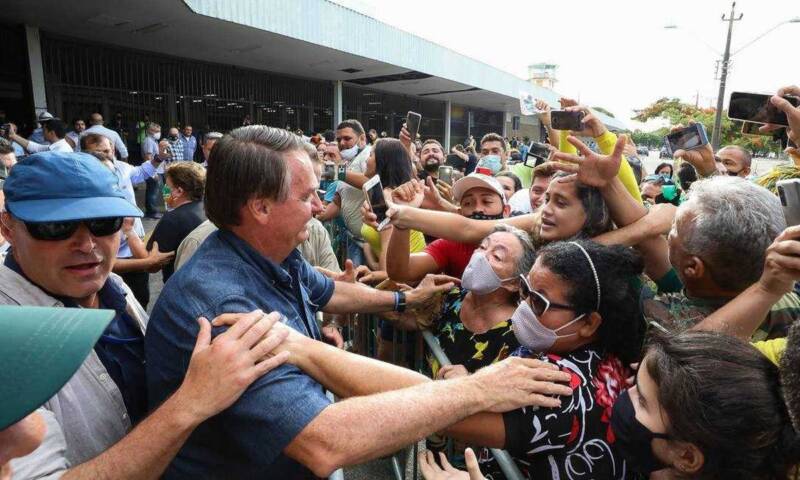Luke Boltansky and Yves Schiabello, in The New Soul of Capitalism, ascribe an important role to criticism. “It exposes the hypocrisy of moral claims that hide the reality of relations of power, exploitation, and control.”[1]
Capitalism uses strategies to contain criticism, or to bend over certain issues raised by critics, to reformulate itself, and to enable a certain degree of social justice. The other option is to weaken, exhaust, and delegitimize cash, so as to enable “capitalism to loosen its justice mechanisms and modify its productive processes with impunity.”[2]
The Bolsonaro government (which follows a process that originated in the 2016 coup) intends to establish this last option. One of the tools used to prevent the emergence of pernicious criticism of capitalism was to flood the public sphere with denial.
Denialism is a strategy so that criticism does not come to light, allowing capitalism to brutalize the process of exploitation and maximize profits. Denial is the ideological weapon used by conservatives in maximizing the workforce, minimizing investments in the public sector, and encouraging privatization and other aberrations of the neoliberal package.
As the historian Reinhart Kosslick has taught us, criticism is connected with crisis, because this is nothing more than a critical state of social formation. From there, we can think with Professor Antonio Candido, “What he thinks is the human face of capitalism is what socialism has torn in sweat, tears and blood.” This human face has also been torn from capitalism by socialist criticism. The purpose of denial is precisely to prevent it from spreading into the public sphere.
Criticism arose with the birth of the public sphere. The bourgeoisie is its great inventor. I used reason in conversations in cafes to build a public opinion contrary to the social structure of the old order.
Today, the same bourgeoisie seeks to contain the spread of criticism because it knows that such a discursive tool can cause instability in the structure that created it. It has taken advantage of technologies that have dominated the public sphere, such as social networks, where information or disinformation spreads in previously unimaginable ways.
Proponents of denial penetrate the field. There is practically no punishment for the false news they produce, as it is not harmful to the system. Even with the pandemic and the alleged increase in strictness to monitor false information, not much has been done regarding impunity.
In this project of power, critics stop criticizing and hardening Capital, criticizing the myth that public money has run out, requiring a spending cap (something that modern monetary theory can easily demystify) and begin to criticize denial. At this point it is no longer critical, and becomes (without wanting to do injustice to Hegel and Marx) a mere denial of denial.
Exact sciences are gaining strength at the expense of the social sciences. Scientists are called to fight denial. Sociologists, historians, etc. They end up following the same trend, as it is no longer new that capitalism based on technological production does not actually subordinate the humanities to the exact sciences. Even the rigors of the academic production of the humanities arbitrarily want to compare the exact production, in terms of time, etc. pity…
Scholars, many of whom are unaware of the dynamics of capital domination, are called upon to fight denial. Remember the last Netflix movie, Don’t Look Up. The scholars who went to the press to fight denial were unaware of how capitalism works in its relationship with the state. When they do, it’s too late.
Astronomer Martin Rees, President of the Royal Society and Director of the Cambridge Institute of Astronomy, represents this aspect well in the real world. In a situation very similar to the movie, he shows his naive optimism. “Imagine that astronomers tracked down an asteroid and calculated that it would collide with Earth in the year 2100, not with certainty, but with a (alleged) 10% probability. Shall we rest…? I don’t think it would. There would be a consensus as to whether we should To start now and do our best to find ways to distract or mitigate its effects.”[3] Then the world applauded the climate initiatives by Obama, Bill Gates and Elon Musk.
In short, many scientists lack the necessary knowledge of social relations of production. Nor deniers.
This discourse of denial takes advantage of a situation of economic crisis in which there is indifference from the working class that is often laid off in order to secure employment. We could even say that the doctrine of denial is part of what Naomi Klein calls the “shock doctrine.”
Finally, the left must offer the tools of criticism to the working class. Show that being controversial is not monetary. Science without a critique of political economy is as alienation as denial. By thinking critically we will change the world.
[1] BOLTANSKI, L. and CHIAPELLO, E. The New Spirit of Capitalism. São Paulo: Martins Fontes, 2009, p. 62.
[2] ibid., p. 64.
[3] Reese, M.; about the future. Rio de Janeiro: Alta Cult, 2021, p. 42-43.
* This article does not necessarily reflect the opinion of the forum.

“Wannabe internet buff. Future teen idol. Hardcore zombie guru. Gamer. Avid creator. Entrepreneur. Bacon ninja.”

